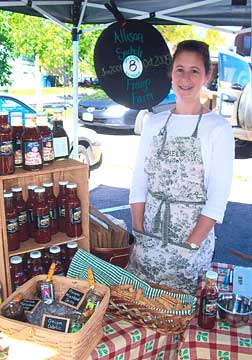Cornell Innovation Center helps an onion jelly maker market her products nationally and globally
By Kara Dunn

POTTER, N.Y. -- When the demand for her onion jelly grew way beyond family and friends, Allison Sacheli needed help adapting her recipe for commercial production. That help came from Cornell's participation in the New York Agricultural Innovation Center (NYAIC) to help farmers increase sales, production efficiencies and consumer demand for their products.
Olga Padilla-Zakour, associate professor of food science and technology and director the Food Venture Center at the New York State Agricultural Experiment Station in Geneva, as well as a NYAIC food-processing specialist, offered a commercial canning course at just the right time. "The timing of the course was serendipitous," Sacheli said. "I could not have done without it or the Ag Innovation Center consultants. There would not have been another, or a less expensive, way for me to set up the required processing protocol and to navigate the necessary licensing paperwork so easily.
Padilla-Zakour and her team, Sacheli added, are "the best clearinghouse for any information you may possibly need. The networking they facilitate is phenomenal. They can quickly tell you who to call to arrange the required commercial kitchen inspection and licensing. The NYAIC consultants are always my first call."
Sacheli began making onion jelly in 2000 as a Father's Day gift, using some of the 9.5 million pounds of onions her family grows at Franjo Farms in Potter, N.Y. She packaged the gift using a label featuring family patriarch Luciano Sacheli, who had started onion farming in the 1950s.
The jelly soon found favor with family and friends who shared it with others, sparking local demand for the product. When Sacheli began selling Luciano Sacheli's Onion Jelly at the Canandaigua (N.Y.) Farmers Market, regional retailers asked if they could carry the product; customers asked for other flavors. Finger Lakes vacationers returned home and soon hometown specialty shops across the country were calling Sacheli for samples and shipments of her eight different products.
In addition to helping Sacheli develop an approved process for commercial food handling and packaging, NYAIC consultants also helped her find a source for jars and labels that Sacheli designed with her family members' names and faces. Although there were fees for the workshops that Sacheli attended, NYAIC's consulting services added few costs for Sacheli.
In the last year the Internet has created such worldwide demand for her products that Sacheli, the mother of three young children, anticipates asking NYAIC consultants for help in locating a co-packer to process and package under Sacheli's label. NYAIC consultants are ready with a list of possibilities and tips on developing a co-packing relationship.
"Through the Ag Innovation Center, entrepreneurs like Allison have access to a variety of resources to assist them in the development of value-added farm products," says Padilla-Zakour. "We can provide assistance with regulatory compliance, evaluation of safety and quality issues, scaling up from kitchen to commercial production, process development, equipment, packaging and ingredients recommendations and specialized training."
The value-added production assistance from NYAIC also has helped Franjo Farms extend its selling season beyond the September to April timetable. Sacheli says, "Selling onion jellies year-round is an enterprise that allows the farm to produce a value-added income during the months we are not selling fresh or storage onions."
Funding from U.S. Department of Agriculture (USDA) Rural Development supported the project at the Cornell Food Venture Center in which Sacheli participated. NYAIC is an initiative of the New York Farm Viability Institute Inc., an independent nonprofit corporation to help New York's agricultural and green industry producers realize farm-level success. NYAIC is supported by the USDA Rural Business-Cooperative Service, with additional support from the New York State Department of Agriculture and Markets and Cornell's Agricultural Experiment Station, College of Agriculture and Life Sciences and Cooperative Extension.
Kara Dunn is a freelance writer in Mannsville, N.Y.
Media Contact
Get Cornell news delivered right to your inbox.
Subscribe